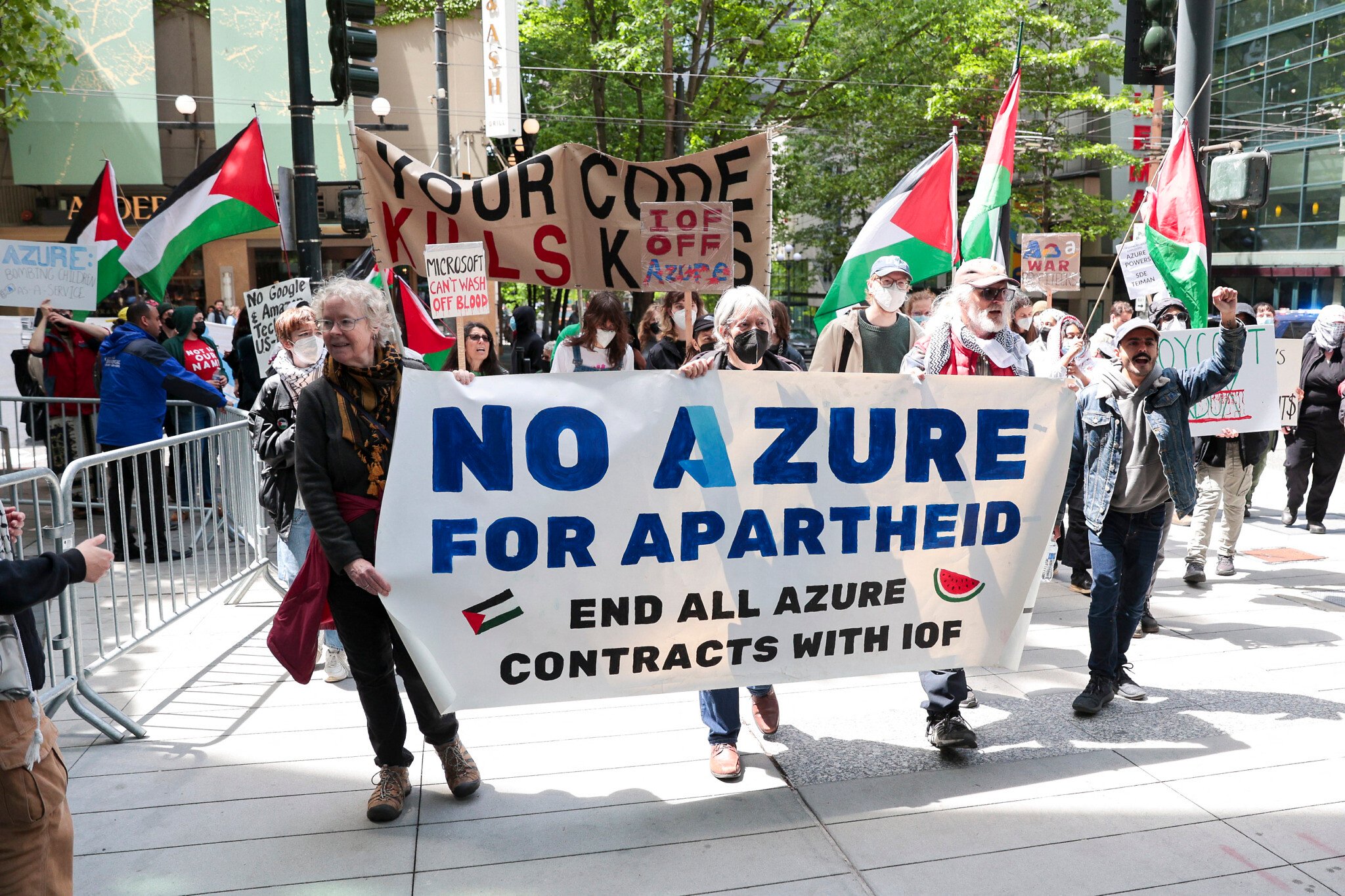Microsoft has terminated four employees following high-profile protests over the company’s contracts with the Israeli military. The firings come after a series of sit-ins, encampments, and internal emails that challenged the company’s involvement in cloud services used for surveillance in Palestine. The controversy has placed Microsoft at the center of a growing debate about corporate accountability, human rights, and employee activism in the tech industry.
Microsoft Employee Protests Lead to Firings
The protests were organized under the banner of the No Azure for Apartheid movement, which calls on Microsoft to end its agreements with Israel’s defense sector. Demonstrations escalated when protesters staged sit-ins at President Brad Smith’s office, while encampments appeared outside company headquarters.
The employees who lost their jobs include Nisreen Jaradat and Julius Shan, both active organizers of the movement. Their removal has sparked further concerns within the workforce about the consequences of internal dissent.
What Sparked the Protests
The protests were triggered after the Guardian revealed that the Israeli military has been using Microsoft’s Azure cloud platform to power advanced surveillance technology targeting Palestinians. The report heightened employee unease, with many questioning whether the company was enabling human rights violations through its business contracts.
Internal Advocacy Emails
Jaradat circulated internal advocacy emails voicing frustration over Microsoft’s handling of the issue. These messages reportedly attracted significant attention across teams, adding momentum to the movement. Employees used internal channels to debate the ethics of Microsoft’s role in supporting military operations in Gaza and the West Bank.
The Sit-In at Brad Smith’s Office
In one of the most visible acts of defiance, protesters entered President Brad Smith’s office, livestreaming their sit-in to a wider audience. They barricaded themselves inside, refusing to leave until their concerns were addressed. The occupation ended only after law enforcement intervened and forcibly removed them from the building.
Microsoft’s Response
Microsoft has stated that the decision to fire the employees was not politically motivated, but rather the result of serious breaches of company policy. The company emphasized that while it values diverse opinions, actions that disrupt operations or violate workplace rules cannot be tolerated.
A spokesperson explained that the firings were necessary to maintain “a safe and professional workplace” and insisted the company would continue to respect freedom of expression, provided it does not interfere with corporate policies or customer commitments.
Why the Firings Matter
The incident underscores growing tensions inside major tech firms, where employees are increasingly vocal about company contracts with governments and militaries. Critics argue that Microsoft’s contracts directly contribute to surveillance and repression in Palestine, while supporters of the company’s stance highlight the need to maintain business relationships and fulfill contractual obligations.
Employee activism in tech is not new. Similar dissent has been seen at Google, Amazon, and Meta, where staff have raised alarms over military contracts, data privacy, and government surveillance programs. What makes Microsoft’s case stand out is the scale of the protests, the involvement of senior offices, and the decision to terminate employees who had taken leadership roles in the movement.
Wider Context: Tech, Gaza, and Accountability
The controversy emerges against the backdrop of heightened scrutiny over the role of technology companies in geopolitical conflicts. The Israeli military has been accused of leveraging advanced surveillance systems to monitor Palestinians, particularly in Gaza. Reports suggest that cloud platforms like Azure enable data-driven tracking, facial recognition, and AI-powered systems that raise human rights concerns.
Microsoft has maintained that it does not directly control how clients use its technology but has not publicly disclosed the specifics of its contracts with Israel. Human rights organizations argue that this lack of transparency allows technology to be deployed in ways that fuel oppression.
Employee Reactions
Within Microsoft, the firings have had a chilling effect on internal activism. Some employees have expressed fear about speaking out, worried that their jobs may also be at risk. Others see the protest movement as a necessary form of accountability, arguing that silence in the face of injustice would make them complicit.
The No Azure for Apartheid organizers released a statement condemning the dismissals, framing them as retaliation against employees who dared to challenge the company’s ties to Israel. They vowed to continue advocating for Palestine and for greater corporate responsibility, even outside the company.
The Bigger Picture for Microsoft
For Microsoft, the firings highlight the delicate balance between maintaining its corporate operations and addressing ethical concerns raised by its workforce. The company faces pressure from multiple sides — governments and defense partners expect loyalty to contracts, while employees and advocacy groups demand ethical accountability.
How the company navigates this conflict may shape its public image for years to come. Tech giants increasingly face questions not just about innovation, but also about how their technology is used in conflict zones and authoritarian regimes.
Looking Ahead
The protests and subsequent firings show that internal dissent within Microsoft is unlikely to fade. With growing global attention on Gaza and Palestine, more employees may question the ethical implications of the company’s government contracts. At the same time, Microsoft is standing firm on its policy enforcement, signaling that future protests could carry similar risks for employees.




